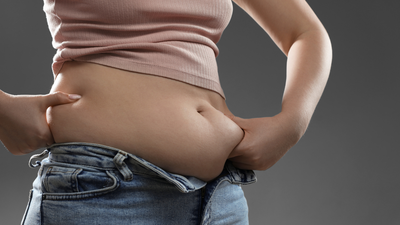
If one has been working out consistently, watching their diet, and still can’t seem to lose that stubborn-bulging belly fat, they might be making one common mistake that hundreds of people do, every day without realising it.No, this is not about skipping cardio, not doing wrong sit-ups, not even our metabolism is to blame. Dr. Eric Berg, a well-known medical expert and best-selling author, shares one common mistake that most of us are doing on our weight loss journey and that is snacking between meals.One might think grabbing a quick bite here and there, handful of nuts or a small fruit, is harmless or even healthy, but every time we eat, our bodies release a hormone called as insulin. Insulin’s job is to manage blood sugar levels, but it also tells the body to store fat instead of actually burning it.
What happens when one snacks too much

The body doesn’t just react to what we consume, it also reacts to how often we eat. Putting food in mouth each time, insulin is released to handle the sugar from that food. The more frequently we eat, the more insulin the body releases throughout the day. The problem: The more insulin the body release, the more resistant the cells become to it! When insulin resistance develops, it becomes much harder for the body to burn the fat, especially around the belly. This is why even when people eat healthy, they sometimes struggle to lose weight, snacking constantly keeps the insulin levels high, and stops the body from switching into fat-burning mode.Here’s the real danger, it not just about fat, repeated insulin spikes throughout the day are one of the root causes behind insulin resistance, which has been linked to every major chronic disease in the U.S.
Belly fat: The first to show, last to go

Belly fat is a particular type of fat, known as visceral fat, one that is stored deeper in the body, around the liver and organs. With the insulin being high all day, the belly fat builds up faster. And when one never gives the insulin a break, like by constantly snacking, the body never gets a fair chance to burn that fat down.
Why and how insulin
Think of insulin as the body’s fat-storage switch, when insulin levels are drastically high in the body, the body focuses on storing fat. When insulin levels are extremely low, the body can burn fat for that extra needed energy. If one eats meals, or snacks throughout the day, the insulin never really goes down. This means that the body does not get a chance to burn the fat when you want to lose.What can high insulin do that makes the weight loss even harder:

- Slows down metabolism
- Fatty liver disease
- Poor sleep quality
- Constant cravings
- More fat around the belly
How to quickly fix this
The good news is that, it is controllable. The key is to stop snacking between meals, and give the body the time to lower the insulin levels. When we eat fewer meals and avoid snacks, the insulin drops. This signals the body to start burning stored fat for energy. One will notice fewer cravings, better sleep and more energy throughout the day.What can we do to avoid snacking between meals
- Aim for 2 to 3 balanced meals a day with plenty of protein, healthy fats and lots of fiber
- Avoid snacks between meals, even if they seem healthy
- Consume plenty of water (within limits, do not push yourself), or herbal teas instead of sugary ones
- Focus on the timing of the meals as much as what you eat
If one really wants to lose their stubborn belly fat, give the body time to digest and let it burn the fat naturally. This one simple change might be exactly what the weight loss journey has been missing.








